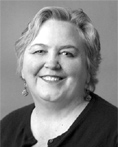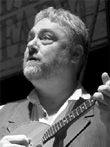




|
|
|
 |
PRODUCTION
SPONSOR: NORMA AND
DAVID LEWIS
Directed by David
Morden
February
25–March 14, 2010
Thursday–Saturday 7:30 P.M., Sunday
2:00 P.M.
Musical Preshow directed by Harlan Hokin
begins 15 minutes before curtain
Discussion with the cast and director follows all performances
Preview Night Thursday February 25, 7:30 P.M.
Pay-What-You-Will Nights
Thursdays March 4 & 11, 7:30 P.M.
Half-price Student Rush 15 minutes before curtain
Performance
Schedule
The Rogue Theatre at The Historic Y
300 East University Boulevard
Free Off-Street Parking
See Map and Parking Information
Produced by special arrangement with Samuel French, Inc.
|
Holding his mirror up to the most minute and mundane
of situations, Samuel Beckett allows a whole world of possibility
to spring to life. From the seed of a moment comes deep insight and
understanding. This evening of one-acts offers three unique journeys
into the poetic and ironic world of one of Ireland’s greatest
writers.

Joseph McGrath (Krapp/Krapp’s Last Tape)
Photo by Tim Fuller
About the
poster
Press
Beckett á trois at Rogue
Theatre
A trio of thought-provoking plays from the master of the absurd
Review of Krapp’s Last Tape, Not I
and Act Without Words by Dave Irwin posted
March 4 on TucsonSentinel.com
Futility oozes from Rogue's
powerful set
3 short plays deliver bleak Beckett
Review of Krapp’s Last Tape, Not I
and Act Without Words by Kathleen Allen in
the March 5 Arizona Daily Star
Hard-Core Art: Rogue tackles
three challenging one-acts by Irish playwright Beckett
Review of Krapp’s Last Tape, Not
I and Act Without Words by Nathan Christensen in the
March 4 Tucson Weekly
Evening with Beckett beautiful
but baffling
Review of Krapp’s Last Tape, Not
I and Act Without Words by Heather Price-Wright in the
March 3 Arizona Daily Wildcat
Fans of Beckett get a thoughtful meal at Rogue Theatre
Review of Krapp’s Last Tape, Not
I and Act Without Words by Chuck Graham on February
28 in Let The Show Begin! at TucsonStage.com
Works of Irish playwright 'are
in a class of their own'
3 short plays by Samuel Beckett due at the Rogue
Preview of Krapp’s Last Tape, Not
I and Act Without Words by Kathleen Allen
in the February 26 Arizona Daily Star

Patty Gallagher (Player/Act Without Words)
Photo by Tim Fuller
Direction
|
|
|
|
David
Morden (Director) has directed The Rogue Theatre’s
productions of A Delicate Balance, The Goat
(2008 Arizona Daily Star Mac Award) and Six Characters in
Search of an Author. David has appeared with The Rogue Theatre
as Editor Webb in Our Town, in the ensembles
of Animal Farm and Orlando, as Madame Pace in
Six Characters in Search of an Author, The Pope in Red
Noses, Yephikhov in The Cherry Orchard, The Man
in the Silver Dress in the preshow to The Maids and Glaucus
in Endymion. He has acted locally with Arizona Onstage
Productions (Assassins), Arizona Opera (The Threepenny
Opera), Actors Theatre (The Bible: The Complete Word
of God (Abridged)) and Green Thursday Theatre Project (Anger
Box, Rain), of which he was a co-founder. David
has directed productions with Green Thursday (Shakespeare’s
R&J, White Garden), Oasis Chamber Opera (Sing
to Love), DreamerGirl Productions (The Dreamer Examines
His Pillow) and Arts For All (The Apple Tree).
|
Director’s Notes
Why Beckett?
A couple of times in this production process, I was asked “Why
Beckett?”
The question, which I have often asked myself, is a great one. Why
present plays by Beckett, who is notoriously challenging and obtuse,
when one could dive into the rich stories of Tennessee Williams or the
comic melancholy of Anton Chekhov or the rich intensity of Henrik Ibsen?
All brilliant playwrights waiting to be produced, so why Beckett? I
quickly discovered the answer to the question shortly after starting
rehearsals for this show.
Beckett’s work, and his words, can be challenging—but not
because they’re particularly complex or difficult. Instead, Beckett
challenges us by refusing to write in a way that is familiar to us.
He expresses ideas and outlooks not with reason and order, but with
feeling and chaos. His rhythms, his situations, his refusal to write
in complete sentences—all these things create a sound that hits
our ears in a new and unfamiliar way. Sometimes, this makes us uncomfortable
or puzzled, but it can also make us feel exhilarated or intrigued. It
can transport us into another world where it is not unusual to see clowns
caught in a stark, post-apocalyptic wasteland or effervescent housewives
stuck up their waist (or neck) in the earth. The “residents”
of these landscapes are often caught in the most excruciatingly mundane
situations, usually having to do with immobility—spiritual, emotional
or actual. They are myopic and dense, and often look a little bizarre.
Yet within their helplessness, we recognize something in ourselves.
As we watch their struggles, we find parallels in our own lives. By
catching us off guard, Beckett is able to hold up a very warped mirror
to us and ask some very probing questions about some very large life
issues. And that, to me, is profundity at the highest level.
Why Beckett? Because he’s provoking and strange and lyrical and
grating and just plain wonderful.
—David Morden, Director of Krapp’s Last
Tape, Not I and Act Without Words
director@theroguetheatre.org

Cynthia Meier (Mouth/Not I)
Photo by Tim Fuller
|
|
|
Cast |
| |
| Act Without Words |
| Player |
|
Patty Gallagher* |
| |
| Not I |
| Mouth |
|
Cynthia Meier |
| Auditor |
|
Patty Gallagher* |
| |
| Krapp’s Last Tape |
| Krapp |
|
Joseph McGrath* |
*Member
of Actors’ Equity Association,
the Union of Professional Actors and Stage Managers in the United
States,
appearing under a Special Appearance Contract
|
Cast Biographies
|
|
|
| |
Patty
Gallagher (Player/Act Without Words,
Auditor/Not I) is Associate Professor of Theatre Arts
at University of California Santa Cruz where she teaches movement,
mask, Balinese dance, and clown traditions. With The Rogue Theatre
she performed the roles of Shen Te in The Good Woman of Setzuan,
Ranevskaya in The Cherry Orchard, Winnie in Happy
Days (most recently for Rogue’s tour to Bangalore,
India), Sonnerie and Scarron in Red Noses, and Orlando
in Orlando. She has worked with Shakespeare Santa Cruz,
The Folger Shakespeare Theatre, California Shakespeare Theater,
The New Pickle Circus, Ripe Time Theatre, Two River Theatre, Teatro
Cronopio and Grupo Malayerba. She has performed, choreographed
and directed workshops in Asia, South America, Europe, and the
U.S.. In 2006 she was Fulbright Scholar in Quito, Ecuador. She
holds a doctorate in Theatre from University of Wisconsin–Madison.
She is Director in Residence for the Clown Conservatory, San Francisco
Circus Center. |
Joseph
McGrath (Krapp/Krapp’s Last Tape)
is a graduate of the Juilliard School of Drama and the Artistic
Director for The Rogue Theatre. For The Rogue, he has performed
in The Fever, The Dead, Endymion, The
Good Woman of Setzuan, The Cherry Orchard, The
Goat, Happy Days, Red Noses, Six Characters
in Search of an Author, Orlando, Animal Farm
and A Delicate Balance (winner of the Arizona
Daily Star 2009 Mac Award for Best Actor) and has
directed The Balcony, Endymion, The Maids,
Red Noses, Immortal Longings (which he also
authored) and Our Town. Joe has toured with John Houseman’s
Acting Company and performed with the Utah Shakespearean Festival.
In Tucson, he is a frequent performer with Ballet Tucson appearing
in The Hunchback of Notre Dame, Cinderella,
A Midsummer Night’s Dream, Dracula and
perennially in The Nutcracker. He has also performed
with Arizona Theatre Company, Arizona Opera, Tucson Art Theatre,
Arizona OnStage, Green Thursday, Damesrocket Theatre, and Old
Pueblo Playwrights in such plays as The Seagull, Assassins,
Oleanna, Threepenny Opera, and Anger Box.
Joe is also a scenic designer and owns Sonora
Theatre Works with his wife Regina Gagliano, producing theatrical
scenery and draperies. |
|

|
Cynthia
Meier (Mouth/Not I) is the Managing and
Associate Artistic Director for The Rogue Theatre for which she
has performed in Our Town, A Delicate Balance, Immortal
Longings, Six Characters in Search of an Author, Red
Noses, The Goat (Best Actress, Arizona Daily Star
2008 Mac Award), The Maids, Endymion and The
Balcony. For The Rogue, she adapted and directed James Joyce’s
The Dead, directed Animal Farm, Orlando,
Happy Days, The Good Woman of Setzuan, The
Fever and The Cherry Orchard. A co-founder of Bloodhut
Productions, Cynthia has also performed in Cat on a Hot Tin
Roof (Arizona Repertory Theatre), A Streetcar Named Desire
(Arizona Theatre Company), Blithe Spirit and A Midsummer
Night’s Dream (Michigan Repertory Theatre), Romeo
& Juliet and Chicago Milagro (Borderlands Theatre),
A Namib Spring (1999 National Play Award winner), and
Smirnova’s Birthday, The Midnight Caller,
and The Ballad of the Sad Cafe (Tucson Art Theatre).
Cynthia is a Faculty member in Speech at Pima Community College
and holds a Ph.D. in Performance Studies from the University of
Arizona. In 2000, Cynthia was awarded the Tucson YWCA Woman on
the Move Award. |

Joseph McGrath (Krapp/Krapp’s Last Tape)
Photo by Tim Fuller
Music Director’s
Notes
Samuel Beckett was a great fan of the music of Béla
Bartók (1881–1945). Bartók’s music sets up
a series of effects that resonate with the textual effects produced
by Beckett’s words and scenarios. The texts (and non-texts) evoke
and portray insight and irony, beauty, confusion, repetition and abandonment.
These same elements can easily be perceived as integral to Bartók’s
music. The light may shine on bits and pieces, suggesting a logic and
directionality that may or may not be perceptible. Sometimes the bits
and pieces recur, sometimes they are presented only to exert their influence
momentarily and disappear immediately. For Beckett, the actual sound
of the words had at least as much significance as the meaning of the
phrases he formed. We also see this characteristic in Bartók’s
music.
Not all of Bartók’s works were small, but
many of the better-known ones were. His volumes of short, increasingly
difficult piano pieces entitled Mikrokosmos have been learned
by many a young pianist. Bartók had an interest as well in folk
music. He based many of his compositions on songs and dances he collected
from throughout central and eastern Europe. His use of folk idioms was
not to be an exotic accent, but rather a chosen language in which he
could directly express himself as a composer. He spoke of his relationship
with folk music thus: “It is a matter of absorbing the means of
musical expression hidden in them [the folk melodies], just as the most
subtle possibilities of any language may be assimilated. It is necessary
for the composer to command this musical language so completely that
it becomes the natural expression of his musical ideas.”
We will play some of Bartók’s short pieces
that we hope reflect the Beckettian Weltanschauung.
—Harlan Hokin, Musical Director
|
Preshow
Music |
| by Béla Bartók,
arranged by Harlan Hokin |
| In Lydian Mode |
| In Myxolydian Mode |
| Melodie with Accompaniment |
| Jarhmarkt |
| Four Roumanian Folk Dances |
| Rogue’s Song |
| Romance (Bird on a branch) |
| In Oriental Style |
| Ruten Kolomejka |
|
|
|
Entr’acte
Music |
Sonata for Solo Violin, Op. 27, No. 2,
2nd movement (“Malinconia”) |
|
Eugène Ysaÿe (1858–1931) |
|
|
|
Musicians |
| Paul Amiel |
|
harp, flute |
| Harlan Hokin |
|
piano |
| Robert Villa |
|
violin |
|
|
|
|
|

|
Harlan
Hokin (Musical Director) has performed extensively
as a singer in Europe and the United States, including a stint with
the Oregon Shakespeare Festival. He earned a doctorate in historical
performance practice from Stanford, and has taught at Stanford and
UC Santa Cruz. Harlan is an active workshop teacher and writer on
topics of interest to singers and early music performers. Recent
theatrical involvement has been with The Rogue Theatre as Musical
Director for Our Town, A Delicate Balance, Animal
Farm, Immortal Longings, Orlando, Six
Characters in Search of an Author, Red Noses, The
Goat, The Cherry Orchard, The Good Woman of Setzuan,
The Maids, Endymion, The Dead and The Balcony,
and Arizona Onstage Productions as Vocal Director for their production
of Assassins. Harlan has also served as music director
for Arizona Theatre Company’s Summer On Stage program. He
is currently serving as Artistic Director for the Arizona Early
Music Society and is the father of two nearly perfect children. |
Paul
Amiel is a multi-instrumentalist who has extensively
studied and performed Medieval, Turkish, Arabic, Chinese, Celtic
and Japanese music both here and abroad. He founded and performs
with the Summer Thunder Chinese Music Ensemble, the traditional
Japanese music duo Musou, and Zambuka (Middle Eastern, Turkish,
and Mediterranean music and dance). Paul has performed music for
The Rogue Theatre’s productions of The Dead, Endymion,
The Good Woman of Setzuan, Orlando, Immortal
Longings and Our Town. |

|

|
|
Robert Villa
has been playing violin for about eight years and his love of music
and violin encompasses more than “classical” music,
as he plays in Zambuka, an Anatolian-Middle Eastern music ensemble
and may occasionally be seen at the local Irish pub on Sundays trying
to learn Irish fiddle. He has performed music for The Rogue Theatre’s
productions of The Dead, Endymion, and Our
Town. Apart from his love of music, he is a passionate naturalist
in love with the cultural and natural history of Mesoamerica and
the Sonoran region. He is a laboratory technician at the Human Origins
Genotyping Laboratory at University of Arizona and the vice president
of Tucson Herpetological Society which is dedicated to the conservation,
education and research of amphibians and reptiles of Arizona and
Mexico. |

Patty Gallagher (Player/Act Without Words)
Photo by Tim Fuller
|
|
|
Production
Staff |
| Stage Manager |
|
Nic Adams |
| House Manager |
|
Susan Collinet |
| Assistant House Manager |
|
JoAn Forehand |
| Box Office Manager |
|
Thomas Wentzel |
| Electrician |
|
Peter Bleasby |
| Scenic Painting |
|
Amy Novelli |
| Additional Costume Construction |
|
Karen DeLay |
| Stage Assistants |
|
Todd Fitzpatrick, Robert Villa |
| Poster and Program |
|
Thomas Wentzel |
| |
Designers |
| Scenic Design |
|
Joseph McGrath |
| Costume Design |
|
Cynthia Meier |
| Lighting Design |
|
Clint Bryson |
|
|
|

|
Clint Bryson (Lighting
Designer) has designed lights for The Rogue Theatre’s productions
of The Balcony, The Dead, Endymion, The
Cherry Orchard, Happy Days, The Goat, Red
Noses, Six Characters in Search of an Author, Orlando,
Immortal Longings, Animal Farm, A Delicate Balance,
and Our Town. Other lighting design credits include As
Bees in Honey Drown and Golf Game for Borderlands,
Woman in Black for Beowulf Alley, and The Seagull
for Tucson Art Theatre. Clint is currently the Shop Foreman, Production
Technical Director and Marketing Director for Catalina Foothills
Theatre Department where he designs and coordinates the construction
of all scenery. He is also a member of Rhino Staging Services, and
a regular participant in Arizona Theatre Company’s Summer
on Stage program where he designs and builds the scenery as well
as teaches production classes. Clint thoroughly enjoys the passion
and integrity that The Rogue brings to their productions and looks
forward to playing his part in their creative journeys. |
Nic
Adams (Stage Manager) has appeared with The Rogue
Theatre in Orlando and Six Characters in Search of
an Author and with the Now Theatre in This Property is
Condemned and Cigarettes & Chocolate, both “Rogue
After Curfew” productions. A theatre student at the University
of Arizona, Nic performed in the Arizona Repertory Theatre’s
productions of Urinetown (Robbie the Stockfish), Titus
Andronicus (Martius), and Candide (Ensemble). |
|
|
|
|
Our Thanks |
Kathy Allen |
|
Jesse Greenberg |
Barbara Freischlad |
|
Tim Fuller |
Joe Schwanz |
|
Chris Babbie
|
Our Advertisers |

Joseph McGrath (Krapp/Krapp’s Last Tape)
Photo by Tim Fuller
Performance
Schedule for Krapp’s Last Tape, Not I and Act
Without Words
Location: The Rogue Theatre at The Historic Y, 300 East University
Boulevard
Free off-street parking! Click here
to see map and parking information.
Performance run time is approximately 1 hour 40 minutes, not including
musical preshow or post-show discussion. There will be one 10-minute
intermission.
Thursday February 25, 2010, 7:30 pm PREVIEW
Friday February 26, 2010
Saturday February 27, 2010, 7:30 pm
Sunday February 28, 2010, 2:00 pm matinee
Thursday March 4, 2010, 7:30 pm PAY-WHAT-YOU-WILL
Friday March 5, 2010, 7:30 pm
Saturday March 6, 2010, 7:30 pm
Sunday March 7, 2010, 2:00 pm matinee
Thursday March 11, 2010, 7:30 pm PAY-WHAT-YOU-WILL
Friday March 12, 2010, 7:30 pm
Saturday March 13, 2010, 7:30 pm
Sunday March 14, 2010, 2:00 pm matinee
|
 T U C S O N A R I Z O N A
T U C S O N A R I Z O N A T U C S O N A R I Z O N A
T U C S O N A R I Z O N A